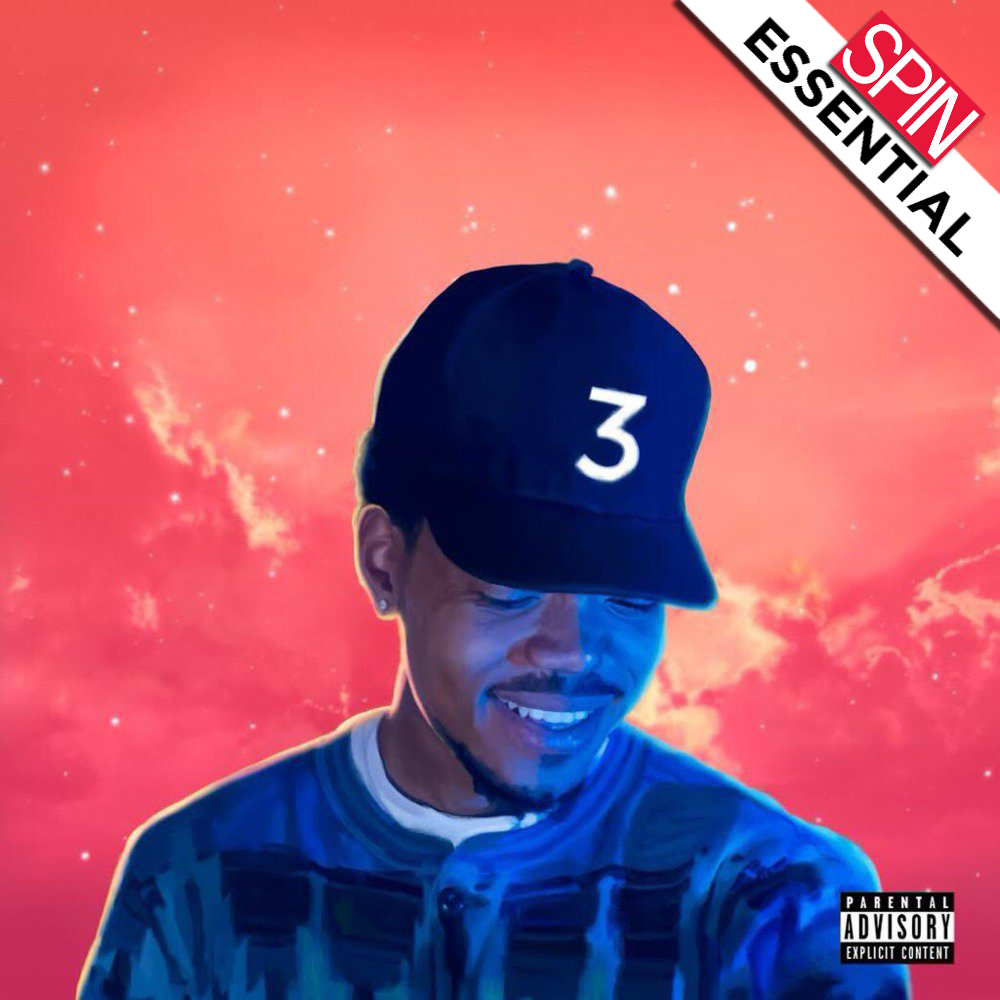Release Date: May 12, 2016
Label: self-released
Give praise for Chance the Rapper’s refusal to conform. Whereas a bounty of other rappers lean into the continued proliferation of druggy trap or transglobal pop, Chance takes a sharp left on the new surprise mixtape Coloring Book, doubling down on his instincts, his sustaining drive, and his singular artistic vision of quirky and joyous rap that aspires to uplift its listeners as much as challenge their notions of what rap should sound like in 2016.
Acid Rap, his second mixtape, made numerous year-end lists and acquired more than a million downloads since its release in 2013. Still, Chance refused a formal major-label signing, instead remaining a free agent of sorts, linked to God’s rolodex. Coloring Book alone features Kanye West, Future, and Justin Bieber, among many other guests with their own gravitational pull, and doesn’t sacrifice the most striking DIY sonic package deal in rap quite possibly since the Bomb Squad detonated Public Enemy.
Fellow hometown legend West has clearly made an impression on Chance. Though Coloring Book solidifies that Chance learned from but isn’t trying to emulate Yeezus. This third mixtape is bookended by “All We Got,” a hopeful and sturdy track featuring a baton-passing West (plus the Chicago Children’s Choir), and a reprise of “Blessings” in which Chance rightly crowns himself thusly: “Kanye’s best prodigy, he ain’t signed me but he proud of me.” Kanye signed to Roc-A-Fella and worked his way up the ranks, but Chance remains famously unsigned — the first unsigned artist to ever appear on Saturday Night Live, in fact — and continues to only release his music for free. The expectations of major labels mean nothing to him; it would be almost heroic if this record didn’t require a subscription from the nightmarish Apple Music to hear for its two weeks of release.
Chance’s 2012 debut, 10 Day, was recorded during a school suspension (for marijuana possession) of that length, and surprised the rap world with its sophistication and charisma. Its weirder follow-up, Acid Rap, further foregrounded his off-kilter flow and seemingly impenetrable positivity, earning its place near the top of 2013 year-end lists and cementing his live presence as a summer-festival gift from above.
Its long-awaited threequel (after a beloved detour for his Social Experiment crew’s Surf last year) hits less directly and challenges its listeners to engage with something downright lovelier than usual; consider the brightness of “Angels” compared to nearly anything else on the radio. But he hasn’t abandoned a thing to get here: As with past efforts, Coloring Book features a who’s who of Chicago performers, as far-ranging as poet Jamila Woods, bandleader Donnie Trumpet, and fellow Save Money member Towkio.
The most common thread here is a push toward the intersection of gospel (and, more specifically, the gospel of the black church) with rap, which should come as no surprise to anyone who witnessed Chance’s headlining set at the 2015 Pitchfork Music Festival. Joined by his effervescent Social Experiment collaborators and the inimitable Kirk Franklin (who also appears on “Finish Line/Drown”), the set solidified the crossover abilities of gospel music to move secular listeners toward the power and possibilities that can be gleamed from one man’s belief in God. On Coloring Book, Chance and his gifted accompaniment reinforce this idea in the studio and echo it throughout.
The human voice is the real star here, layered and harmonized dutifully on the straightforward “How Great,” the quieted “Blessings,” even the cutesy interlude “D.R.A.M. Sings Special.” Woods returns for “Blessings” (after appearing on the Social Experiment’s hit ode to Chance’s grandmother, “Sunday Candy”), which may be the most explicitly religious track of Chance’s career. Alongside references to Jericho, the Kingdom, and how “Jesus’ black life ain’t matter, I know I talked to his daddy,” Woods’ turn singing, “I’m gon’ praise Him, praise Him ’til I’m gone / When the praises go up, the blessings come down,” occurs as naturally as it would on a worship release.
These lyrics don’t signal a real turn from the Chance of the past; he’s always been something of a wholesome rapper, even when he rapped about drugs, accessible to both ends of the casual and hardcore rap-fan spectrum alike. But you can feel Chance entering a different phase of his life here, one in which his connection to a higher power holds more influence in his day to day. Did his new fatherhood or hard-won success lead to this moment? They arrived inseparably.
The “Blessings” reprise is one of the few instances on this guest-heavy mixtape in which Chance appears alone, to reflect by himself on the people, places, and circumstances that made him into the artist and father he is today. Three mixtapes in and he continues to rep for Chicago on moments like “Angels,” even though the ability for its acts to break out becomes increasingly difficult in a rap industry dominated by coastal trends. Rather than exploit the stereotypes of the South Side, he promotes the city’s collective artistry, collaborating with artists still very much on the come-up, like Knox Fortune (who has but one solo track to his name on Soundcloud).
Chance makes a point of creating outside of the rap-world vacuum: “All Night” is a straight-up dance track produced by Kaytranada (who has worked with other Chicago performers like Towkio) and challenges the influx of opportunistic latecomers to his new fame and success. It’s funny and fun, incorporating disco and boogie beats, and sure to remain one of the most lasting impressions from this mixtape as summer approaches.
Few other tracks here are as radio-ready, which has never been Chance’s driving concern. On Coloring Book, he displays the most joyful part of his universe, and invites listeners across the globe to share in the festivities. “I’m still at my old church, only ever sold merch / Grandma say I’m Kosher, momma say I’m culture,” he reiterates on “Angels.” Chance is the culture here and he is giving it to the world.





